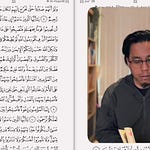Reflecting on our Tafseer of Surah Al-An’am
Alhamdulillah, it’s great to be back together after Eid. Eid Mubarak to everyone—I hope your Eid is joyful and filled with blessings. May Allah accept all our deeds from Ramadan and grant us the opportunity to experience an even more meaningful Ramadan next year.
Tonight, we continue our tafseer of Surah Al-An’am, picking up from Ayah 90, where we paused before Eid. Our aim now is to complete the remaining eleven pages, covering roughly a page each week. Once we finish this surah, I plan to go back and complete the last four surahs from Juz ’Amma, after which we’ll pick a new topic or maybe start studying a classical text together, inshaAllah.
As usual, we start our session with a beautiful recitation of Ratib Al-Haddad, reconnecting spiritually and setting a tranquil mood for our discussion.
Today, we look at the prophets mentioned in Surah Al-An’am—Ibrahim, Dawud, Sulaiman, Ayyub, Yusuf, Musa, and Harun—and see how Allah uses their stories to comfort Prophet Muhammad ﷺ during his own times of difficulty. Each prophet faces unique challenges: Dawud and Sulaiman experience tests of gratitude (shukr), while prophets like Ayyub, Yusuf, and Musa endure tests of patience (sabr).
The story of Prophet Yusuf (AS) especially resonates deeply because it closely parallels the struggles faced by Prophet Muhammad ﷺ. Both prophets experience rejection from their closest family members yet achieve eventual success through patience and reliance upon Allah.
We also discuss the special role of Sayyidina Ali, highlighting how Ali supports Prophet Muhammad ﷺ from the earliest days. It’s important to have balanced love: loving Ali deeply doesn’t require us to dislike Abu Bakr or Umar. In fact, Ali himself names his children after these companions, reflecting their strong bond of brotherhood and mutual respect.
Allah instructs us explicitly in this surah to follow the guidance and examples of these prophets and companions. Their lives serve as practical guides that help us navigate our own challenges.
Tonight, we also discuss the unique authenticity and preservation of the Qur’an. Unlike previous scriptures, which undergo alterations and corruption, the Qur’an remains meticulously preserved through memorisation and oral transmission. I often share this remarkable aspect of the Qur’an during interfaith dialogues at the university, surprising many who learn how deeply Muslims engage with their scripture—even memorising it without necessarily understanding its language fully.
Finally, we emphasise a crucial point: true belief in the Hereafter (Akhirah) directly leads us to safeguarding our prayers. Prayer is a key indicator of our faith and our belief in the life to come. Now, as Ramadan has ended, let’s strive to maintain our dedication to prayers, proving our sincere belief in the Akhirah.
May Allah enable us to internalise these reflections, strengthen our connection to the Qur’an, and bless our ongoing journey. See you all next week, inshaAllah!











